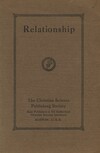Are you sure?
This bookmark will be removed from all folders and any saved notes will be permanently removed.
"Greater love hath no man"
The world in general has always been and is eagerly seeking an answer to these questions: What is love and friendship? What is its origin and cause? Why is it so rarely successful? Why is it so often fleeting—a broken reed, a house built on the sands? And how can worthwhile friendships and true affection be brought into our experience? In the fifteenth chapter of John is recorded Jesus' answer to these questions—an answer which, metaphysically discerned through the teachings of Christian Science, changes the concept of love and friends from a material to a spiritual basis. He said, "Greator love hath no man than this, that a man lay down his life for his friends." From the standpoint of the old theological teaching, this passage was commonly supposed to mean that a man should be willing to rescue his friend from danger by risking his own human life, and even if that risking should result in so-called death, he had proved his love for his friend! It is cause for gratitude that, viewed in the light of Christian Science, this belief in mere martyrdom is dispelled and the real idea of "greater love" is discerned. First, what is Love? On page 465 of "Science and Health with Key to the Scriptures" we find this definition: "God is incorporeal, divine, supreme, infinite Mind, Spirit, Soul, Principle, Life, Truth, Love." These terms being synonyms are interchangeable, and so Love is Truth, Love is Life, Love is Principle, Soul, Spirit, infinite Mind, and therefore is supreme, divine, and incorporeal, not in man, but reflected and expressed by man. Since God is Love, and man, God's idea, reflects in unity and completeness all that God is, man must express divine Love and exemplify the love of God, good. And because man can express nothing that is unlike God, he expresses nothing that is unlike good; in other words, he can never for one moment be unloving.
Now to find what the meaning of friend is to the real metaphysician: Mrs. Eddy says farther down on page 465 of Science and Health that "Principle and its idea is one, and this one is God, omnipotent, omniscient, and omnipresent Being, and His reflection is man and the universe. Omni is adopted from the Latin adjective signifying all. Hence God combines all-power or potency, all-science or true knowledge, all-presence." If we as Christian Scientists know God to be all the presence there is, then God must be the only Friend there is; and as man and the universe reflect God there must be an infinity of idea expressing friend, and the divine idea being one with Principle and forever in its rightful place is ever available as friend. It follows, then, that friend, according to the teachings of Christian Science, is "God with us" expressed in that manifestation of good that meets our present need."
The one reason that a friend seems to fail us is because we are looking to that friend, yearning for that friend, or leaning on that friend humanly, seeing friend as person, instead of God's idea, as material instead of the expression of Mind's attributes—kindness, patience, meekness, consideration, courage, wisdom, and so on. As the law of mathematics is found to exist in the realm of Mind and is available to all who gain an understanding of its fundamental laws, so a demonstrable understanding of metaphysics is available to all who will apply its fundamental laws to their problems. If your well-loved friend is in Japan or India, California or Connecticut, is he separated from you? Is there a number seven in Japan and a number three in India that you must go after before you can be sure of a ten as the bringing together of these two numbers in your problem? As the infinity of numbers is ever present, so is the infinity of friend. Just as soon as we let go our human clinging to person and see "God with us" everywhere expressed, and rejoice in and reflect the love of good in our daily living, right then and there shall we find the false belief of distance annihilated and our friend, all that is real, with us.
Enjoy 1 free Sentinel article or audio program each month, including content from 1898 to today.
JSH Collections
This article is included in:
1921 - PAMPHLET
Relationship
JSH-Online has hundreds of pamphlets, anthologies, and special editions for you to discover.
January 22, 1921 issue
View Issue-
Success
ALDEN F. POTTER
-
"Greater love hath no man"
HAZEL L. ZIMMERMAN
-
Joy
LESLIE M. KNAPP
-
Holidays
LLOYD ROBERTS
-
Hope Unbound
MAUD W. MAKEMSON
-
True Labor without Self-Righteousness
ADELAIDE SINGLETON
-
The First Commandment
FRANK BARNDOLLAR
-
The New Year
LENA M. HALL
-
Responsibility
Frederick Dixon
-
Eyes and Ears
Gustavus S. Paine
-
Assurance
FLORA F. GOOCH
-
Some time ago I found myself, according to the human...
Herbert Watson
-
Five years ago last November I turned to Christian Science...
Lalla E. Morris
-
It is with deep gratitude that I send this testimony to...
Robert E. Hobbs
-
It would be very ungrateful of me to wait any longer...
Eliza C. Moulton
-
About seven years ago, very shortly before a child was...
George C. Putnam
-
One of the greatest blessings that has come to me through...
Grace Margaret Watterson
-
I have decided to make a public answer to a question...
Druie E. Thompson
-
It is a wonderful thing after years of weakness, unrest,...
Ethel Adele Denny
-
In "Science and Health with Key to the Scriptures"...
Jennie Hunter
-
Signs of the Times
with contributions from Robert Donald, F. O. Seamans, Ellis Paxson Oberholtzer, John Henry MacCracken, Charles Stelzle, Sacramento, Clay MacCauley




